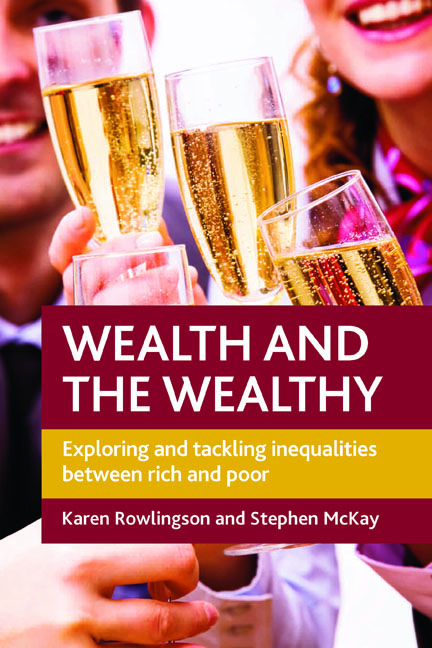Book contents
- Frontmatter
- Dedication
- Contents
- List of tables and figures
- Acknowledgements
- About the authors
- Introduction
- one Why wealth matters
- two Why the wealthy matter
- three What is wealth and who are the wealthy?
- four The distribution of wealth
- five The rich, the richer and the richest
- six Towards a comprehensive policy on assets
- seven Social policy and the wealthy
- Conclusions
- References
- Index
two - Why the wealthy matter
Published online by Cambridge University Press: 01 September 2022
- Frontmatter
- Dedication
- Contents
- List of tables and figures
- Acknowledgements
- About the authors
- Introduction
- one Why wealth matters
- two Why the wealthy matter
- three What is wealth and who are the wealthy?
- four The distribution of wealth
- five The rich, the richer and the richest
- six Towards a comprehensive policy on assets
- seven Social policy and the wealthy
- Conclusions
- References
- Index
Summary
Introduction
Chapter One focused on why wealth, in the form of personal assets, matters. This chapter explains why the wealthy matter. As argued in the introduction, ‘wealth’ and ‘the wealthy’ are related but represent two distinct sets of issues. Most of the wealthy have high levels of personal assets but some might be considered ‘wealthy’ (or ‘rich’) due to extremely high levels of income – they may be ‘income rich but asset poor’. This raises the issue of who might be considered ‘wealthy’ and we discuss this, in detail, in the next chapter. In this chapter, however, we argue that there are four key reasons why social policy should focus more attention on the wealthy.
The first is that, partly as a result of some of the trends discussed in Chapter One, the gap between rich and poor has grown since the 1980s, and an increasing body of empirical research suggests that this gap between rich and poor, as distinct from poverty itself, has negative effects on society, for example, in relation to health outcomes. If this is the case, then this provides a reason why social science, and social policy in particular, should not only concern itself with discussing ways of reducing poverty but also ways of reducing the gap between rich and poor.
The second reason for focusing on the wealthy is that the concentration of wealth among a very few people at the top may have contributed to, if not caused, the economic crisis that the world is still struggling to recover from at the time of writing this book.
The third reason for paying attention to the wealthy is that, regardless of the empirical evidence on the social or economic effects of inequality, a large gap between rich and poor may be unjust if those who become rich do so through luck of birth rather than merit. It is therefore important to consider the extent of equal opportunity within an unequal society and the role of policy.
And, finally, even if equal opportunities exist there may nevertheless be injustice if the resulting amount of wealth accumulated by some people goes beyond what might be considered a fair reward for differences in effort, skill and so on.
- Type
- Chapter
- Information
- Wealth and the WealthyExploring and Tackling Inequalities between Rich and Poor, pp. 19 - 52Publisher: Bristol University PressPrint publication year: 2011



